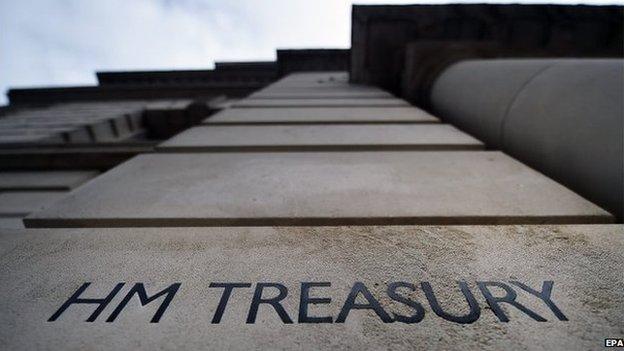Treasury wants reinvention of public sector
- Published
- comments

It is incredibly bad economics to compare household finances and state finances.
But occasionally it is useful, for illustrative purposes.
And today I want you to imagine what you would cut from your lifestyle if told that your income would fall by either 25% or 40%, after adjusting for inflation, over the next four years.
It is quite a scary thought, isn't it?
Presumably, if you haven't done it already, you'll think about switching the weekly shop to one of those discounters. You will heat up the water for fewer hours. And the kids' swimming lessons will have to go.
But those savings would not even scratch the surface of a 40% cut. To reach that, the kids may have to share a bedroom, so you can take in a paying lodger. And the car would be history.
All of which serves to explain why ministers and officials in all but protected departments and services - that is everything but health, schools, defence and overseas aid - are having panic attacks today.
Public service reinvention?
Because they have been instructed by the chancellor to "model" the impact on the services they provide of finding savings of either 25% or 40% by 2019-20 - or £20bn per annum of cuts in aggregate.
This is the stuff of public-service reinvention, not efficiency. Which is not to say that better buying of paper clips won't still yield something.
But the last Parliament had a massive onslaught on waste, bad buying, duplication of services and under-use of assets.
The low hanging fruit of improved productivity has already been picked.
Now ministers have to be bold and creative in doing more for less, if they are not simply going to kill the provision of some services we take for granted.
The Treasury's document, published today, talks a fashionable talk about how digital delivery and big data can work cost-saving miracles.
Well, maybe. But the brainy chaps who work for George Osborne are probably a bit like me, in that they understand the theory of all this without having a clue how to put it into practice.
Ministers and management
Which is not to say that the targets are unachievable or that in five years' time we will be a third-class country for culture, law and order, transport and so on.
But it is to remind that ministers aren't management-consultant productivity gurus. And we have a generation of civil servants, who grew up under the post-97 Labour government, who were better at spending than saving and were demonstrably appalling at IT.
Three other things.
First, austerity-loathing Scotland will detest the implied block-grant settlement for their nation that flows from this negotiation.
Second, health may not be quite as protected as seems at first blanche, given all the Treasury's enthusiastic talk about merging health and social care spending, and devolving management of the lot to the regions.
And finally, the implied cuts of between 12% and 18% (depending on who is measuring) imposed on the BBC a few days ago with the transfer to it of the free licence for over-75s no longer looks quite as savage as it did.